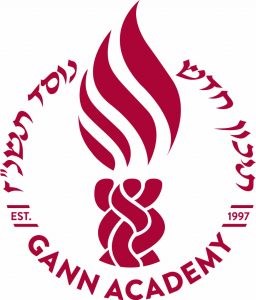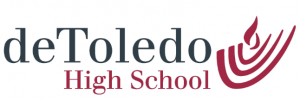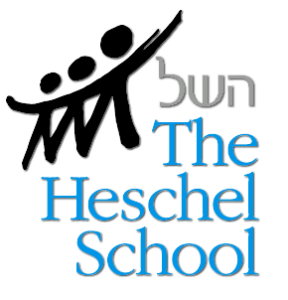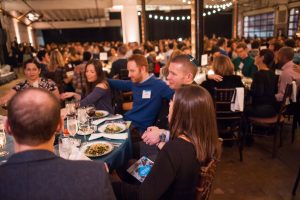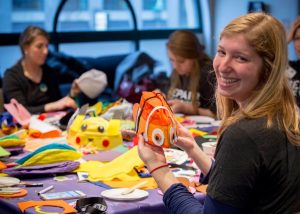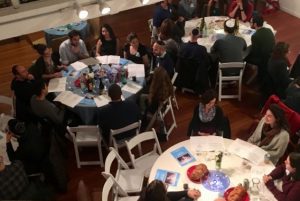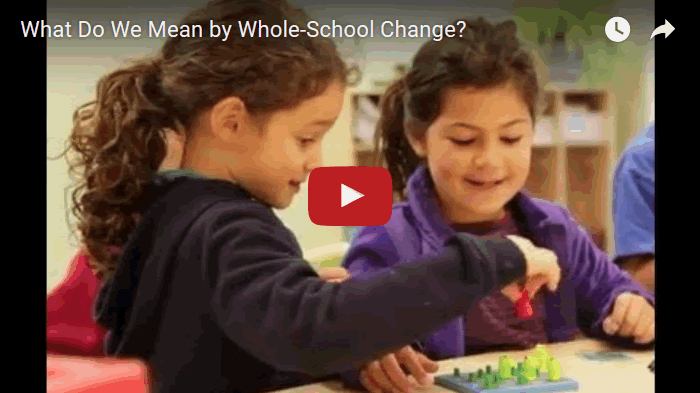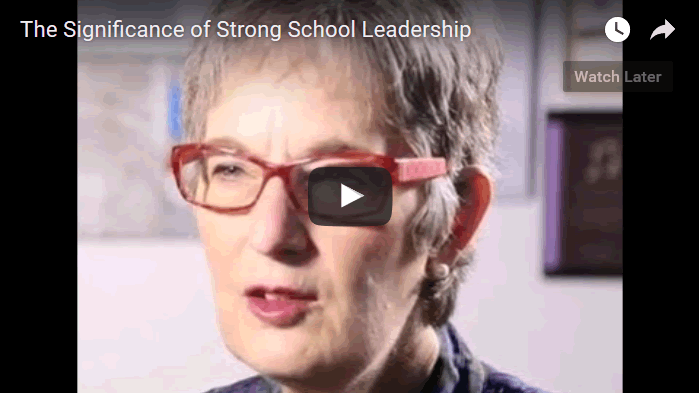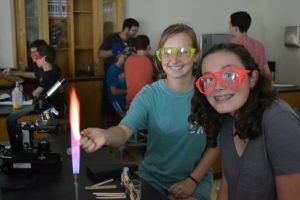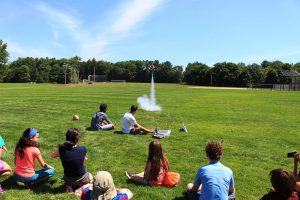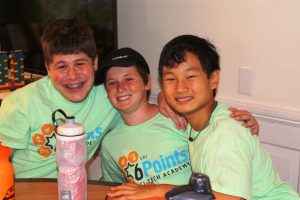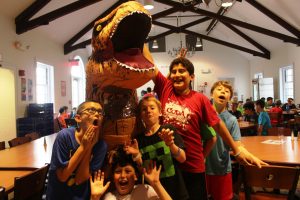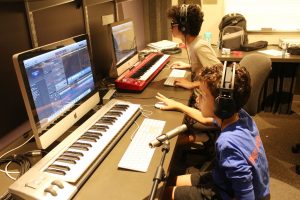As it marks its 10-year anniversary and completes a landmark merger, UpStart embarks on its next phase to support communities advancing innovation in Jewish education and Jewish life. A coordinated group of funders is helping to elevate UpStart’s role as a national intermediary supporting Jewish innovation and serving as a one-stop shop for the tools, network, and resources innovators need to succeed.
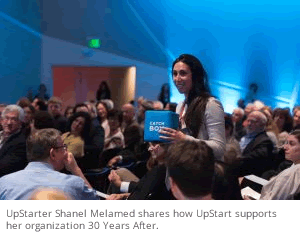 When UpStart adopted us, we had a vision and a couple of successful events, and we believed that our idea had what it would take to become an amazing organization. In truth, we had no idea what it would take and I don’t think we could have gotten here without UpStart.
When UpStart adopted us, we had a vision and a couple of successful events, and we believed that our idea had what it would take to become an amazing organization. In truth, we had no idea what it would take and I don’t think we could have gotten here without UpStart.
– Julie Wolk, Co-Founder, Board Member, Wilderness Torah
UpStart recently celebrated the 10-year anniversary with a community celebration honoring its founding CEO, Toby Rubin, in San Francisco. Originally launched as an Accelerator for early-stage Jewish organizations bringing something fresh and relevant to Jewish life, UpStart later expanded its services to support long-standing institutions in opening up new pathways for impact.
Within the first year of joining the Accelerator, KAHAL doubled in every conceivable metric, from participants, to dollars, to staff. That trajectory has only continued, and now we’re poised to serve thousands more students across the world.
– Alex Jakubowski, Executive Director, KAHAL: Your Jewish Home Abroad
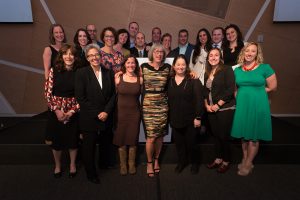
Toby Rubin with alumni and current members of the UpStart Accelerator.
With the new coordinated funding, UpStart is poised to complete the merger with Joshua Venture Group, Bikkurim, and the U.S. programs of PresenTense; to embark on critical planning processes; and to continue UpStart’s and the other merged organizations’ current programs. At the same time, the organization will work to fulfill its new and expanded vision: Expansion of programs to nurture innovation at every stage of organizational life; Increase in resources flowing into Jewish innovation, including more seed funding for innovative programs/initiatives; Investment in field-based research and evaluation of impact; Harnessing the power of a larger, more diverse innovation network; and Connecting a growing network of independent cities through regional hubs covering North America.
Now with offices in the Bay Area, Los Angeles, Chicago, Denver, and New York, UpStart hosts programs in 13 communities across the country and has plans for expansion. Since their inception, UpStart and its three merging organizations have fueled the impact of over 1,300 organizations and trained nearly 3,000 of the Jewish community’s most inspiring leaders. The collaborative of funders cumulatively awarded $3.2 million, a portion of which is allocated as matching grants designed to spur other giving.
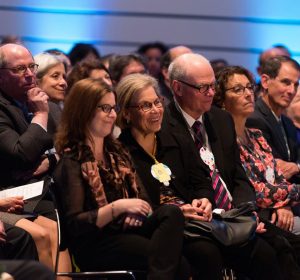
UpStart’s 10-year anniversary event
“Over the three years that I was an UpStarter, UpStart accelerated Edah’s development—providing us with substantive, emotional, and financial support at key junctures in our organizational trajectory. Talented UpStart staff combined just-in-time coaching, content-rich seminars, and connections with a cadre of other creative Jewish Social entrepreneurs to inspire innovation and support sustainability.”
– Rena Dorph, Founder and Board Chair, Edah, a program of Studio 70
The collaborative of funders includes previous and new donors, such as the Charles and Lynn Schusterman Family Foundation, The Crown Family, The Diane P. and Guilford Glazer Fund of the Jewish Community Foundation of Los Angeles, Jim Joseph Foundation, Joyce and Irving Goldman Family Foundation, Kaminer Family, Lippman Kanfer Foundation for Living Torah, Lisa and John Pritzker Family Foundation, Marcus Foundation, Natan Fund, SeaChange-Lodestar Fund for Nonprofit Collaboration, and the Walter and Elise Haas Fund.
 Supported by the Jim Joseph Foundation, Charles and Lynn Schusterman Family Foundation, and Lippman Kanfer Foundation for Living Torah, the study builds on the previous and ongoing work of the
Supported by the Jim Joseph Foundation, Charles and Lynn Schusterman Family Foundation, and Lippman Kanfer Foundation for Living Torah, the study builds on the previous and ongoing work of the 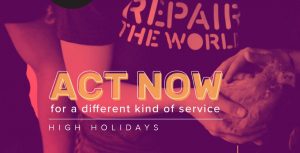
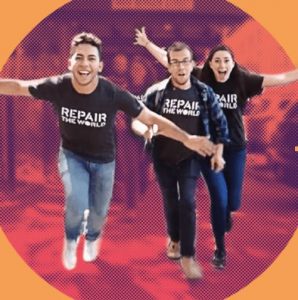 their greater networks to get involved. Utilizing its highly collaborative model, Repair the World will work in partnership with local organizations around the country to help address pressing needs specific to each community, expanding the capacity of organizations and bringing a Jewish lens to the volunteering experience. Visit
their greater networks to get involved. Utilizing its highly collaborative model, Repair the World will work in partnership with local organizations around the country to help address pressing needs specific to each community, expanding the capacity of organizations and bringing a Jewish lens to the volunteering experience. Visit 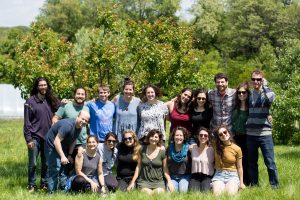 are gaining the skills to create and deliver JOFEE programs infused with rich meaning and learning. And with an estimated hundreds of thousands of participants now engaging in JOFEE annually, there is a need for even more talented leaders and educators in the field.
are gaining the skills to create and deliver JOFEE programs infused with rich meaning and learning. And with an estimated hundreds of thousands of participants now engaging in JOFEE annually, there is a need for even more talented leaders and educators in the field.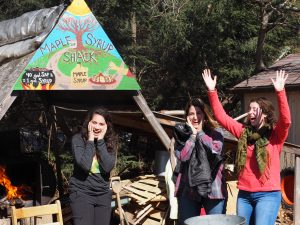 Just a sampling of some of the programs created by Fellows include “Havdallah & Moon Celebration at the Farm,” “Israel Hike & Bike Trip for Young Professionals,” “Avodat Lev (morning prayers) and Jewish text study at San Quentin Prison,” and over 20 Sukkot-related programs and Tu Bishvat seders for youth, teens, young adults, and families. Many Fellows from Cohort 1 still work in JOFEE, continuing to create programming and often times taking on greater leadership roles within their organizations.
Just a sampling of some of the programs created by Fellows include “Havdallah & Moon Celebration at the Farm,” “Israel Hike & Bike Trip for Young Professionals,” “Avodat Lev (morning prayers) and Jewish text study at San Quentin Prison,” and over 20 Sukkot-related programs and Tu Bishvat seders for youth, teens, young adults, and families. Many Fellows from Cohort 1 still work in JOFEE, continuing to create programming and often times taking on greater leadership roles within their organizations.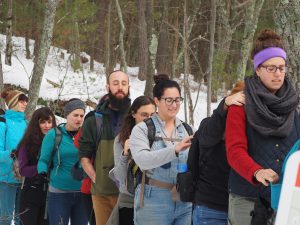
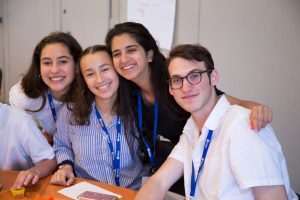 The
The  In addition to information about each community initiative within the Collaborative, extensive research on teens, and reflections from practitioners on the ground, the website shares two new items: the
In addition to information about each community initiative within the Collaborative, extensive research on teens, and reflections from practitioners on the ground, the website shares two new items: the 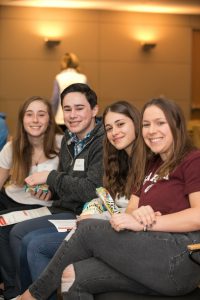 The communities in the Funder Collaborative are Atlanta, Baltimore, Boston, Chicago, Cincinnati, Denver, Los Angeles, New York, San Diego, and San Francisco. Teen initiatives that have been launched by Funder Collaborative communities include a range of Jewish experiences—from volunteer service to professional internships to surfing and more. Nearly all communities attribute early programmatic successes to their participation in the collaborative and its steadfast commitment to knowledge-sharing. The evolution of the collaborative itself is central to creating an environment that fosters risk-taking, experimentation and ongoing reflection.
The communities in the Funder Collaborative are Atlanta, Baltimore, Boston, Chicago, Cincinnati, Denver, Los Angeles, New York, San Diego, and San Francisco. Teen initiatives that have been launched by Funder Collaborative communities include a range of Jewish experiences—from volunteer service to professional internships to surfing and more. Nearly all communities attribute early programmatic successes to their participation in the collaborative and its steadfast commitment to knowledge-sharing. The evolution of the collaborative itself is central to creating an environment that fosters risk-taking, experimentation and ongoing reflection.


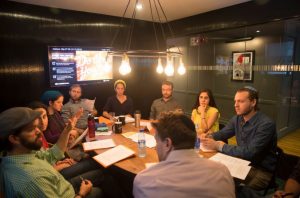 Developed in partnership with M2: The Institute for Experiential Jewish Education, Hillel’s Office of Innovation (OOI) Fellowship for Rabbinic Entrepreneurs is a one-year internship for rabbinical students of all denominations who seek to build the communities they wish to serve. Working at local Hillels and with other partners, OOI rabbinic entrepreneurs participate in a series of retreats, biweekly seminars, and practica to learn the critical skills to design, develop, and scale new Jewish communities.
Developed in partnership with M2: The Institute for Experiential Jewish Education, Hillel’s Office of Innovation (OOI) Fellowship for Rabbinic Entrepreneurs is a one-year internship for rabbinical students of all denominations who seek to build the communities they wish to serve. Working at local Hillels and with other partners, OOI rabbinic entrepreneurs participate in a series of retreats, biweekly seminars, and practica to learn the critical skills to design, develop, and scale new Jewish communities.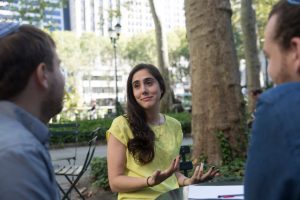 But they’re not simply reading about these approaches and strategies. They’re experiencing them—often in new ways. As just one example, Fellows received a special tour of Equinox’s Bryant Park branch—and upscale fitness center—through every nook and recess of the cavernous complex. With clipboards in hand, Fellows observed the sounds, sights, smells, and feel around them as they learn about “User Experience.” Different Fellows note various details, and all are struck by the precision of language used to describe the various activities, elevating the mundane activity of exercise into a bona fide “experience.” This, they realize, can greatly inform how they help create Jewish experiences.
But they’re not simply reading about these approaches and strategies. They’re experiencing them—often in new ways. As just one example, Fellows received a special tour of Equinox’s Bryant Park branch—and upscale fitness center—through every nook and recess of the cavernous complex. With clipboards in hand, Fellows observed the sounds, sights, smells, and feel around them as they learn about “User Experience.” Different Fellows note various details, and all are struck by the precision of language used to describe the various activities, elevating the mundane activity of exercise into a bona fide “experience.” This, they realize, can greatly inform how they help create Jewish experiences.